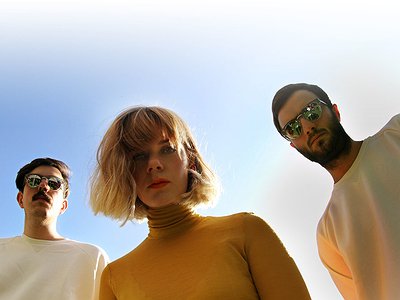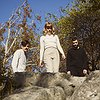Could you describe your creative process on the basis of a piece or album that's particularly dear to you, please?
Molly: For the song Till We Get Enough on our most recent EP the idea came from a repeated synth line Max had made. It had a mystical, twinkly quality. From that we came up with the first two lines ‘keep me satisfied, bring me back to life’. I knew I wanted to write about an obsession with technology and commercialism and those two lines inspired the concept for the song. Once we had the concept the lyrics came together pretty quickly. We knew we wanted the song to build throughout and that’s why it has an ABABC structure - we wanted the final section to feel overwhelming and repetitive. As for sounds Max had played with layering arpeggios and pads but it wasn’t till we got to the studio and worked with our producer Steph Marziano that the song really began to take shape and every sound had it’s place.
Where did the ideas come from, how were they transformed in your mind, what did you start with and how do you refine these beginnings into the finished work of art?
Molly: We are always collecting ideas for songs and writing things down. A lot of what we write about is a reflection of how we’re feeling or what we’re absorbing from the zeitgeist. With the concept for Till We Get Enough it was a combination of both things. How we get to the final product is a lot of trial and error, we’re not people who can finish a song in a day usually. It takes a lot of time working on something, spending time away from it, coming back to it, reworking it in order for us to end up with a finished piece of work that we’re happy with.
There are many descriptions of the ideal state of mind for being creative. What is it like for you? What supports this ideal state of mind and what are distractions? Are there strategies to enter into this state more easily?
Max: For us we have to approach it from a place of calm and to simply want to have fun and enjoy the process. We’ve heard others say that pressure put on them or stress can help them be creative but that simply doesn’t work for us at all. I think writing can be a self conscious process so it’s important for us to feel relaxed and good about what we’re doing. Then we’re more likely to see what’s working and encourage each other. We are very easily distracted as people so we try not to have our phones present and give us more then a few hours so we don’t feel rushed or half committed.
How is playing live and writing music in the studio connected? What do you achieve and draw from each experience personally? how do you see the relationship between improvisation and composition in this regard?
Molly: I think they’re very much connected. As just Max and I write the songs together we are always considering what Pete’s live drums will sound like during the writing process. We want him to be able to have fun on stage and we know Pete’s playing is such a vital part of us as a band so we make sure that’s a consideration throughout. We also are very visual people so we consider how a song will feel and look to an audience when we’re fleshing it out. We always want it to be able to translate live. The studio experience is very important for us to create music that we’re happy with and proud of. But the experience of playing live is just as important as it breathes life back into our music and gets us excited about what we’re doing again. It’s also important for us to perform our songs to an audience and feel that connection with people.
How do you see the relationship between the 'sound' aspects of music and the 'composition' aspects? How do you work with sound and timbre to meet certain production ideas and in which way can certain sounds already take on compositional qualities?
Max: I feel our compositional process can only start when we feel a ‘connection’ with a sound.
We can be going round and round a synth sound or chord progression and not feeling anything but a misplaced finger in a chord or an accidental syncopation of a melody can create something that we instantly hook onto and can spark up a whole idea or a sound world we want to explore.
Our sense of hearing shares intriguing connections to other senses. From your experience, what are some of the most inspiring overlaps between different senses - and what do they tell us about the way our senses work? What happens to sound at its outermost borders?
Molly: If I’m completely honest I think music is most appreciated on it’s own with no other distractions. We take it for granted too much as a society and have it on in the background where we will tune in and out from it, but I think to truly experience music you need to isolate it. I love seeing an artist live but I will always prefer listening to that artist at home or in private where you can be fully absorbed. If I’m looking at something my eyes are too easily distracted by irrelevant details and I lose focus on what I’m hearing. I never think there has to be a visual element to music for it be powerful.
Art can be a purpose in its own right, but it can also directly feed back into everyday life, take on a social and political role and lead to more engagement. Can you describe your approach to art and being an artist?
Max: Our approach to art is to create something that has an authentic voice. We want our music to say something meaningful. ‘Meaningful’ doesn't mean that the concepts must be groundbreaking or revolutionary but they must be true to us and our own experiences. As long as our ‘voice’ feels unique and personal then we have achieved something.
It is remarkable, in a way, that we have arrived in the 21st century with the basic concept of music still intact. Do you have a vision of music, an idea of what music could be beyond its current form?
Molly: I think the value of the artist and the person behind it is decreasing more and more to the consumer. Authenticity doesn’t seem to have as much weight as it did with the mainstream now. The fact that artists don’t even hide that they don’t write their own music and admit that songwriting camps of dozens of people produce most of what you hear in the charts means that moving towards AI and algorithms to create commercial music could be the future. Maybe music will stop needing to have a person in front of it entirely in order for it to sell? With that depressing thought in mind I also believe there will always be a counter culture to what is going on in the mainstream and artists will continue to have authentic relationships with their fans albeit on a smaller scale.



